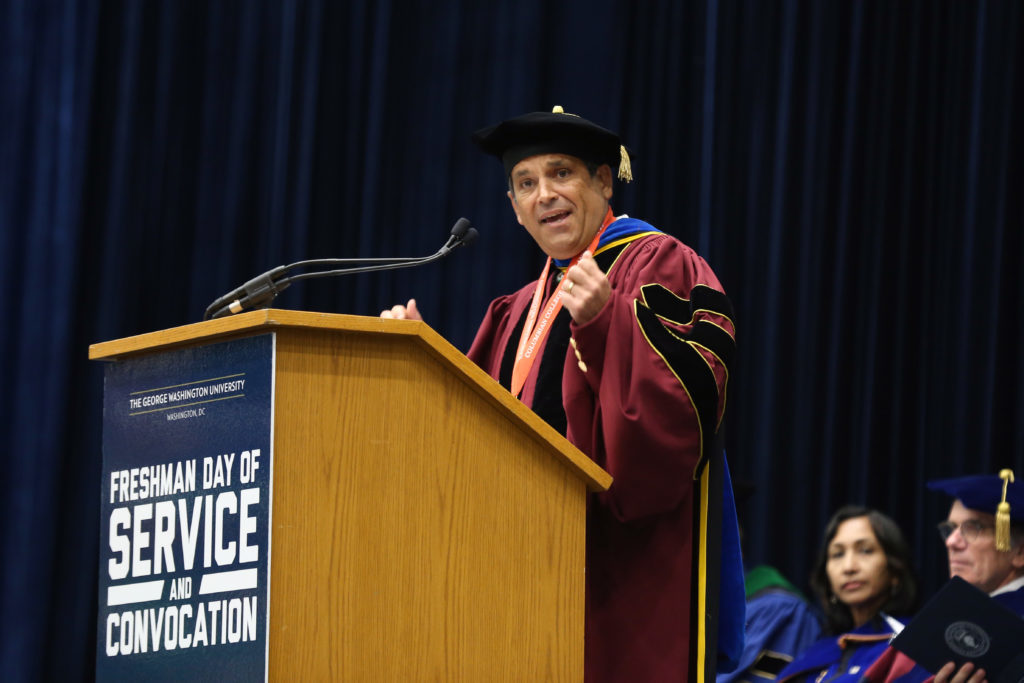For the first time in four years, the University is considered one of the top 200 schools in the world, according to annual Times Higher Education rankings.
GW jumped at least 19 spots in the ranking of global universities this year to land at No. 181 in the publication’s 2019 rankings. Officials and professors said the increase is indicative of GW’s yearslong goal to improve its global stature and may indicate a boosted reputation around the world.
For the past four years, the University has hovered between 201 and 250 on the list. Times Higher Education does not list colleges’ specific ranks after No. 200 but lists colleges in 50-integer ranges.
GW cracked the top 100 schools in 2011, clocking in at No. 95 that year. But in the years that followed, the University steadily fell in the rankings, dropping more than 40 spots in 2012 and another roughly 30 spots in 2013, according to the Times Higher Education archives.
The University fell to No. 194 in 2014, and 2015 was the last year in the top 200.
Provost Forrest Maltzman said GW’s rankings bump “is a significant improvement over last year.” He said the ranking this year improved because faculty research has been cited more often, showing that GW researchers are “shaping the work of others.”
He said the University’s commitment to globalization has also positively influenced the rankings.
“We have long known that our ability to fulfill our teaching and research missions requires us to attract students and faculty from around the world and to conduct research collaboratively with scholars in different countries,” he said.
Since his first day on campus last year, University President Thomas LeBlanc has said one of his top priorities as president is to transform GW into a global research institution. At the same time, GW has focused on extending its global reach to international students, and officials said last fall they are diversifying recruitment efforts to attract international students outside of China and India – countries that are heavily represented at GW.
“We hope that research and innovation will be driving forces as we continue to advance GW as an academic institution in today’s global society,” Maltzman said.
Henry Nau, a professor of political science and international affairs and member of the Faculty Senate, said the return to the top 200 should be a starting point for LeBlanc to make improvements to research and globalization this academic year, in line with his strategic initiatives.
He said GW lost international momentum over the past few years because the University started to struggle financially, which is what could have contributed to the downturn in rankings years ago.
GW lost millions of dollars in revenue when graduate enrollment missed projections in 2014, prompting budget cuts in subsequent years. GW’s ranking on U.S. News and World Report rankings has dropped consistently since.
Nau added that international student recruitment and global attention should not be the University’s sole focus because maintaining high educational and research standards are also top factors in global rankings.
“It won’t do us any good if we attract a lot of international students or even get recognized internationally if our overall standards are going down,” he said.
Charles Garris, a professor of electrical engineering and the former chairman of the Faculty Senate, said the ranking is consistent with GW’s goal to be recognized internationally because a higher ranking will attract more international students who see the upward trajectory of GW’s reputation.
He said LeBlanc’s strategies and goals to improve GW’s international standing cannot be connected with the University’s increase in rankings because officials have been working on improving the University’s global reputation for years.
LeBlanc has not yet traveled to a foreign country – though he has said he plans to this year – but former University President Steven Knapp regularly visited foreign countries to fundraise and meet alumni and parents.
Garris said GW shouldn’t become too reliant on international students because world events, like military coups and trade wars, can cut off pipelines of students coming in globally.
“While we’re encouraging international students, they bring a lot to the University, we shouldn’t become too reliant on them because world events can go sour on you,” he said.





